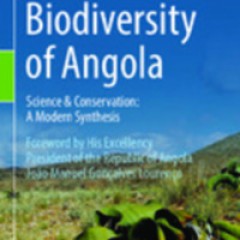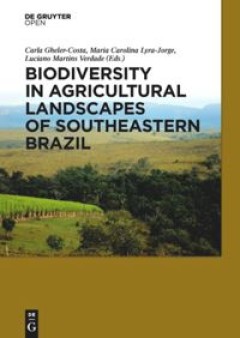Filter by

Biodiversity of the Gulf of Guinea Oceanic Islands : Science and Conservation
This open access book presents a comprehensive synthesis of the biodiversity of the oceanic islands of the Gulf of Guinea, a biodiversity hotspot off the west coast of Central Africa. Written by experts, the book compiles data from a plethora of sources – archives, museums, bibliography, official reports and previously unpublished data – to provide readers with the most updated information …
- Edition
- 1
- ISBN/ISSN
- 978-3-031-06153-0
- Collation
- 694
- Series Title
- -
- Call Number
- XXV, 694

Biodiversity of Angola : Science & Conservation : A Modern Synthesis
This open access multi-authored book presents a 'state of the science' synthesis of knowledge on the biodiversity of Angola, based on sources in peer-reviewed journals, in books and where appropriate, unpublished official reports. The book identifies Angola as one of the most biologically diverse countries in Africa, but notes that its fauna, flora, habitats and the processes that drive the dyn…
- Edition
- -
- ISBN/ISSN
- 978-3-030-03083-4
- Collation
- 549
- Series Title
- -
- Call Number
- -

Biodiversity in Agricultural Landscapes of Southeastern Brazil
The state of São Paulo, Brazil, is one of the most densely populated and developed areas in South America. Such development is evident both in terms of industrialization and urbanization, as well as in agriculture, which is heavily based on sugar cane, Eucalyptus plantations and livestock. This intense land use has resulted in great alteration of the original land cover and fragmentation of na…
- Edition
- -
- ISBN/ISSN
- 9783110480979, 9783110480849
- Collation
- 366
- Series Title
- -
- Call Number
- -

Advances in managing organic matter in turfgrass ecosystems
Many factors contribute to excessive thatch accumulation, including rapid and dense growth of the turfgrass species, excessive fertility and irrigation, and infrequent cultivation programs
- Edition
- -
- ISBN/ISSN
- 9781801463737
- Collation
- -
- Series Title
- -
- Call Number
- -

Ecosystem-Based Management, Ecosystem Services and Aquatic Biodiversity = T…
Aquatic ecosystems are rich in biodiversity and home to a diverse array of species and habitats, providing a wide variety of benefits to human beings. Many of these valuable ecosystems are at risk of being irreversibly damaged by human activities and pressures, including pollution, contamination, invasive species, overfishing and climate change. Such pressures threaten the sustainability of the…
- Edition
- 1
- ISBN/ISSN
- 9783030458430
- Collation
- VIII, 580 hlm; ill., lamp.,
- Series Title
- -
- Call Number
- -

Forest and Rangeland Soils of the United States Under Changing = A Comprehen…
This open access book synthesizes leading-edge science and management information about forest and rangeland soils of the United States. It offers ways to better understand changing conditions and their impacts on soils, and explores directions that positively affect the future of forest and rangeland soil health. This book outlines soil processes and identifies the research needed to manage fo…
- Edition
- 1
- ISBN/ISSN
- 9783030452162
- Collation
- XXVI, 289 hlm; ill., lamp.,
- Series Title
- -
- Call Number
- -

Biodiversity of Angola: Multidisciplinary Methods and Tools for a Low Carbon …
This open access book analyzes and seeks to consolidate the use of robust quantitative tools and qualitative methods for the design and assessment of energy and climate policies. In particular, it examines energy and climate policy performance and associated risks, as well as public acceptance and portfolio analysis in climate policy, and presents methods for evaluating the costs and benefits o…
- Edition
- 1
- ISBN/ISSN
- 9783030030834
- Collation
- XVIII, 549hlm,: ill, lamp;
- Series Title
- -
- Call Number
- -

Green Infrastructure and Climate Change Adaptation : Function, Implementation…
This open access book introduces the function, implementation and governance of green infrastructure in Japan and other countries where lands are geologically fragile and climatologically susceptible to climate change. It proposes green infrastructure as an adaptation strategy for climate change and biodiversity conservation. In the face of climate change, dams, levees and floodways built as…
- Edition
- -
- ISBN/ISSN
- 978-981-16-6791-6
- Collation
- XII, 506
- Series Title
- Ecological Research Monographs (ECOLOGICAL)
- Call Number
- 570 GRE

Goods and Services of Marine Bivalves
The aim of this open access book is to review and analyse the goods and services of bivalve shellfish. How they are defined, what determines the ecological functions that are the basis for the goods and services, what controversies in the use of goods and services exist, and what is needed for sustainable exploitation of bivalves from the perspective of the various stakeholders. The book is foc…
- Edition
- 1
- ISBN/ISSN
- 9783319967769
- Collation
- XXV, 591 hlm,: ill, lamp;
- Series Title
- -
- Call Number
- -

Human-Nature Interactions
This edited volume aims to widen the discussion about the diversity of human-nature relationships and valuation methods and to stimulate new perspective that are needed to build a more sustainable future, especially in face of ongoing socio-environmental changes. Conceptual and empirical approaches, including qualitative, quantitative, and mixed methodologies have been used to highlight the imp…
- Edition
- 1
- ISBN/ISSN
- 978-3-031-01980-7
- Collation
- -
- Series Title
- -
- Call Number
- XVIII, 438
 Computer Science, Information & General Works
Computer Science, Information & General Works  Philosophy & Psychology
Philosophy & Psychology  Religion
Religion  Social Sciences
Social Sciences  Language
Language  Pure Science
Pure Science  Applied Sciences
Applied Sciences  Art & Recreation
Art & Recreation  Literature
Literature  History & Geography
History & Geography